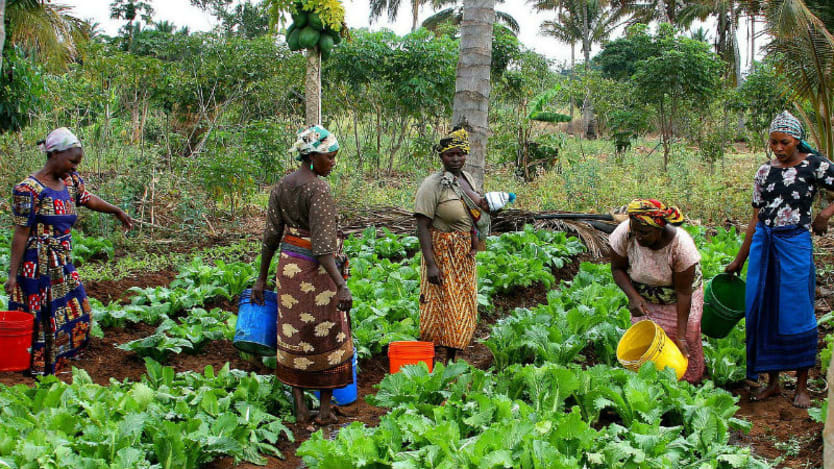
To build your expertise in agriculture in the global development sector, both hard and soft skill sets are essential: You will need in-depth knowledge while also being personable and approachable, as the role involves technical research and analysis as well communication with farmers, cooperatives, and local communities.
Devex spoke with long-standing experts to get their insights into the skills and expertise required to succeed as an agriculture, including how to gain in-field experience and climb the career ladder.
Scientific degree
Whether it’s in agronomy, ecology, horticulture, or geography, a degree with a scientific background is necessary for a career in agriculture, said Janie Rioux, natural resources climate change officer at the Food and Agriculture Organization of the United Nations
More on building your expertise in:
➪ Health
Chuck Chopak, vice president of development results at DAI, attained a double major undergraduate degree in biology and sociology. The combination of hard and social sciences offers a solid foundation for a career in agriculture, Chopak said. It provides the fundamental science behind the discipline, such as agronomy, yet develops real-world understanding and complexities of implementing scientific solutions to human populations.
While an undergraduate degree can be more general, a graduate degree needs to focus on your area of interest, Chopak said. He also recommended gaining professional experience prior to continuing with further education to work out where your interests lie.
In-country experience
Our experts agreed that field experience is extremely important, as is interacting with more experienced professionals.
“Competence is not achieved by two years of a master’s degree in a particular area,” said Musa Mulongo, senior scientist and program coordinator at the International Livestock Research Institute.
FAO’s Rioux advised taking full advantage of the flexibility and freedom to travel and work internationally while you are a student or in the early stages of your career.
Similarly, Mulongo recommended taking advantage of funding and other opportunities while studying. A number of donors offer international fellowships, he said: “There are many available. It’s not very complicated to find a bit of money here and there to put together a short visit to a global country.” Be proactive to find these opportunities.
Chopak also encouraged international field experience: “There’s no replacement for being in the field.” ACDI/Voca, Catholic Relief Services, and Peace Corps are some volunteer programs he recommended.
“It’s one thing to live in the ‘[global] south’ and understand the problem, it’s another thing to have some experience in actually trying to solve a problem in international development,” Mulongo said.
Solid communication
Good communication — both written and oral — are highly sought after and necessary. At university, there’s an emphasis on academic writing, but you need to be able to translate that to suit specific audiences, Chopak said, whether that’s government officials or people on your team.
“You need to take the technical and make it accessible,” Chopak continued.
Both Rioux and Chopak agreed that Interpersonal skills are also very important.
“You need to interact with farmers, with cooperatives, also with agriculture extension officers,” Rioux said. “There’s an exchange of information … you provide guidance on one hand, but on the other hand, you also need to be able to understand their situation,” she said.
Chopak said that it’s important, especially earlier in one's career, to have humility and be open and willing to learn.
Mulongo also pointed to cultural awareness and the need to accept a different way of doing things: “We deal with so many people from different cultures, different attitudes, and you’ve got to find a way to be able to cope with everybody in a diplomatic and respectful way.”
Climbing the ladder
Throughout your career, the required skills and expertise change. The ability to think analytically is especially important earlier on in your career, Rioux said, developed through of a lot of research and analysis, while managerial skills can take center stage later on.
Software is in constant flux, so Rioux recommended mastering geographical information systems, imagery analysis, and remote sensing analysis tools, along with developing an understanding of statistics.
Chopak and Mulongo both emphasized the importance of networking. Attending conferences, events, reaching out to people, and staying in touch are all ways to cultivate career opportunities.
Building and maintaining an online presence
Building and maintaining your online presence is key to succeeding as an independent consultant. More than just a medium for employers to find you, it forms a large part of your personal brand, showcasing your achievements.
Social networks such as LinkedIn and Twitter are also good ways to stay up to date with the latest happenings and reach out to people already working in your field, Mulongo said.
Chopak strongly recommended finding a mentor — a professor at university, someone at work, or a network connection, he said.
“A lot of it, with a mentor, is finding out what you do like, but also what you don’t like, and what you don’t want to focus on, and helping you find your passion and where to focus all of your energy,” Chopak said.
As you move up the career ladder and into more managerial roles, gaining project management skills is very useful, Chopak said.
In some organizations, you enter into project management first, Chopak said, which allows you to grow those skills while also seeing the technical side of things and which areas interest you most.
“I would’ve appreciated it if somebody gave me the advice earlier in my career to get some managerial skills and some project management backstopping expertise,” he said.
For more coverage on professional development, visit the Skills for Tomorrow site here.









